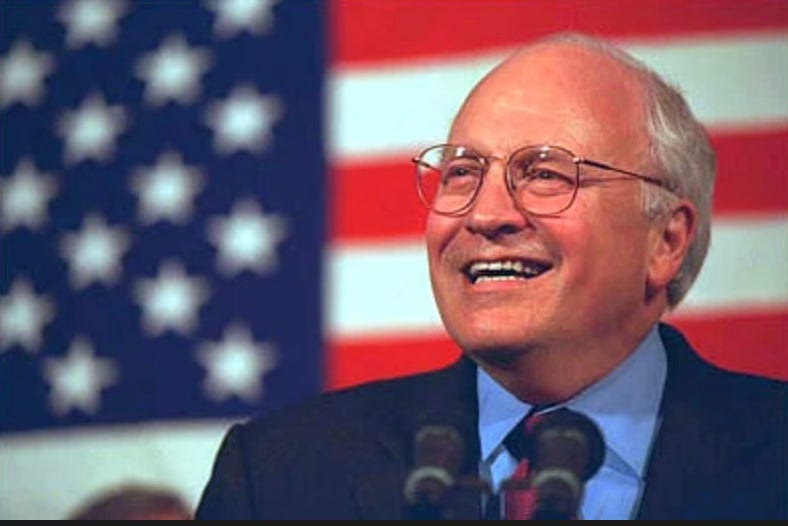Former Vice President Richard Cheney gained attention in June 2004 for using profanity during the Senate class photo. The expletive was directed at Democratic Sen. Patrick Leahy of Vermont. David Bohrer/White House photo via Britannica.com
One recent Sunday morning before heading to church planted a seed.
An errand for two milk products for the new week ended with a 20-something female walking with her significant other male, dropping the F-bomb directed at her car.
The foul-mouthed female created a deep disrespect because of her filthy mouth.
Just days later, U.S. Rep. Majorie Taylor Greene, R-Ga., had a reporter question her following the hearing with Dr. Tony Fauci on June 3. She stated her frustration with Democrats accusing her and other Republicans of Trump worship. In the next thought, Greene blurts out two profanities, including the F-bomb. She is a public official who would go out of her way to ensure everyone knew she was a Christian.
America is well past the seven dirty words from comedian George Carlin in the 1970s. Profanity in American culture is pervasive and excessive.
Hollywood offers a doctorate-level class on gratuitous profanity in nearly every new movie that hits theaters and TV shows in primetime.
This issue isn’t about people who say something regrettable in the heat of the moment. People make mistakes. It’s about people with gutter mouths better suited for a sewer than normal, respectful, and courteous human communication.
Profanity too often rushes like a flood. It’s words, gestures, and acronyms that leave no doubt what is communicated.
In March 2006, the Associated Press reported the following from a poll:
Nearly three-quarters of Americans questioned last week — 74 percent — said they encounter profanity in public frequently or occasionally, according to an Associated Press-Ipsos poll. Two-thirds said they think people swear more than they did 20 years ago.
The Iraq war lowered standards for elected officials, with John Kerry using the F-bomb related to the war. In June 2004, then Vice President Dick Cheney used the F-bomb directed at Democratic Sen. Pat Leahy’s complaints about Halliburton’s non-bid contracts for the war. Cheney was Halliburton CEO and board chairman prior to being vice president under President George W. Bush. Also, Bush was caught on a surprise open microphone in fall 2000 calling New York Times reporter Adam Clymer an expletive.
Did elected officials using profanity set a standard for Americans? Or were they reflecting the behavior of Americans who elected them?
By April 2016, a Reuters-Ipsos poll revealed the number encountering profanity rose to 77 percent.
Hunter Schwartz of CNN’s COVER/LINE reported in December 2018 about an expletive former first lady Michelle Obama used at a public event for her memoir. That, combined with President Donald Trump’s expletive used in January 2018 to describe El Salvador, Haiti, and African nations, just widened the gutter.
The debut of social media didn’t benefit civil communication, especially for public officials. The data analytics firm GovPredict started tracking the use of profanity on social media by members of Congress and state legislators. Schwartz reported:
In 2014, the firm tracked 83 instances of lawmakers using profane words. Over the next two years, usage rose slowly, but in 2017 – the year President Donald Trump took office – it exploded, with 1,571 instances. So far this year (2018, emphasis added) there have been 2,409 instances.
With Trump still in the headlines, it’s doubtful anything has altered this trend.
“Conservative influencers” also use profanity on social media.
Podcaster Dan Bonino spoke at the Turning Point Action Conference in West Palm Beach, Florida in 2023. Gage Skidmore/Wikipedia
For example, on Tuesday morning I listened to part of a conversation Ben Shapiro had with podcaster Dan Bongino. In talking about Hamas, the Daily Wire bleeped out multiple words of a six-minute segment that landed on social media. Bongino is by no means alone. I’ve heard it from several other conservative influencers.
Meanwhile, people right of center will identify and talk about many things that are indecent in our culture.
It might be the defense of 85,000 children lost in human trafficking at our southern border.
It might be the LGBTQIA+ agenda, which ranges from drag queen story hours and drag shows to the grooming of children that could be happening in public schools, all without communication with parents.
How do you intend to make your case with a rational argument about indecency in our culture, if the language you use is indecent?
How do you intend to win hearts and minds to restore decency and order in our culture, if the language that you use is indecent and filled with filthy talk?
This is a culture where spoken and written words, in any setting, are grounds for being canceled or doxxed. The political divisions have never been more striking as we see today.
Folks are more inclined to lean on using profanity to make their point, not being the adult who raises the standard by being intelligent and articulate without profanity.
Shifting this profanity trend is long overdue nationwide, but especially conservatives must be better than this.






